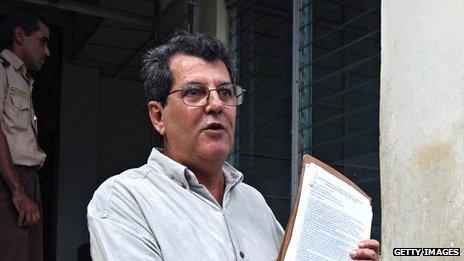Spain asked to probe death of Cuba activist Oswaldo Paya
- Published

Oswaldo Paya won the EU's human-rights award in 2002
The family of a Cuban dissident who died last year have filed a complaint in Spain alleging that he was killed by senior Cuban military officers.
The family of Oswaldo Paya filed a case in the High Court asking for an inquiry into the official account that he died in a car crash.
According to Cuban officials, Paya and another dissident, Harold Cepero, died in the crash in July last year.
Paya was a prize-winning campaigner for civil rights.
His family have long dismissed the official account of his death, alleging that the Cuban security services killed him.
"[His death] was not an isolated incident, it was the result of a continuing process that started a long time ago," Paya's brother, Carlos, told the Spanish news agency Efe.
The Spanish court has jurisdiction over allegations of crimes against humanity committed abroad when Spanish citizens are involved.
Paya had Spanish and Cuban nationality and a Spanish politician, Angel Carromero, was convicted of vehicular manslaughter for driving the car when Paya died.
Carromero was jailed for four years in Cuba, though he has been allowed to serve most of his sentence in Spain.
He has since denounced the Cuban account of the death, and said in an interview with El Mundo newspaper that Paya was not killed in the crash.
Paya was known as the founder of the Varela Project, a campaign set up in 1998 to gather signatures in support of a referendum on laws to guarantee civil rights.
In 2002 he won the Sakharov Prize, the European Union's human rights award.
- Published14 December 2012
- Published24 July 2012
- Published23 July 2012